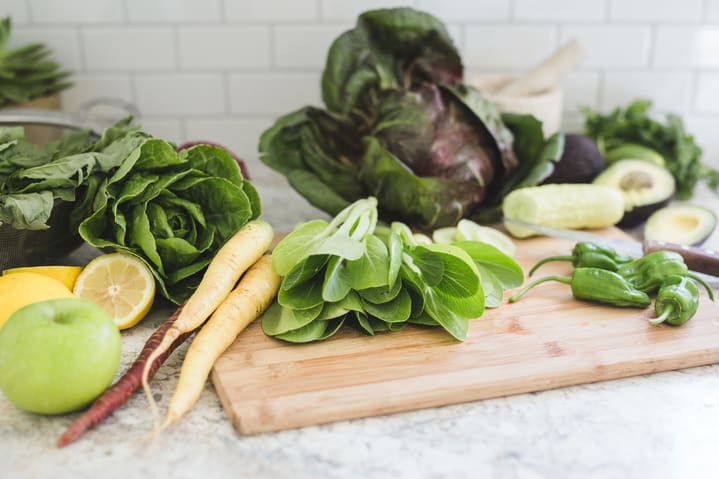
“You shouldn’t eat chocolate; it will make you break out!”
You’ve probably been confronted with a warning about chocolate and acne at least once, right? (Or we’ve heard it come out of our own mouths–before we knew better!) The good news is that chocolate doesn’t necessarily cause acne breakouts. What CAN cause acne is the dairy and salt commonly found in many chocolate products. Dark chocolate is actually loaded with antioxidants that are beneficial for your skin!
So what about fried foods, pizza, cheeseburgers, and milkshakes? Are those acne-safe foods, too? Not so much. Are there foods that can help promote clear skin? Definitely. Let’s jump in together to find out the what and the why behind your diet and acne.
Does Food Cause Acne?
What you eat has a significant impact on the health of your skin. As our largest organ, our skin has a big job to do. Not only does skin protect us from the elements by providing a defensive barrier, but it also helps to regulate our body temperature and allows us to feel the sensation of touch. Beyond these essential functions, your skin is also the face that you present to the world. When clear and healthy, it’s easy to put your best face forward in confidence. When inflamed and covered in pimples, the tendency is to want to cover up and hide.
Even though you’re not putting food directly on your face, the food that you put into your body can cause inflammation, allergic reactions, sensitivities, excess sebum production, and aggravated acne. At the same time, the right foods can have the opposite effect, resulting in the clear, glowing skin you’ve been hoping for. So you want to have good skin that you’re proud to show off? Watch what you eat, and you’ll see the difference in your skin as the months and years go by.
Nutritional Support For Optimal Skin Health
Eating the right foods will help heal your acne, bring down inflammation, protect your skin from oxidative damage (premature aging), and get you clear faster. The foods below are high in antioxidants, vitamins, androgen blockers, and anti-inflammatory support. Eating a well-balanced, low-glycemic diet is helpful in all aspects of your health, including the skin.
Foods That Heal Acne
| Vegetables | Beets, purple cauliflower, purple sweet potato, purple carrots, broccoli, green & red peppers, tomatoes |
| Fruit & Berries | Blueberries, dark cherries, pomegranates, acai, black grapes, papaya |
| Healthy Oils | Avocado oil, olive oil, coconut oil |
| Leafy Greens | Spinach, kale, watercress |
| Tea & Spices | Green tea (especially homemade matcha), spearmint tea, ginger, cinnamon, turmeric |
| Omega-3 Fatty Acids | Deep leafy greens, blueberries, Brussels sprouts, wild-caught salmon, sardines, anchovies, herring, white fish, Atlantic mackerel |
| Supplements | CurcumaSorb, O.N.E. Omega, zinc, & probiotics |
Acne-Causing Foods & Where You Will Find Them
The first step to avoiding acne-causing foods is checking all the nutritional labels of the foods that you purchase. Some foods are more obvious, such as milk and other dairy foods. Soy and algae are also very commonly found in the diet, yet most people are unaware that they are eating them on a regular basis. These ingredients are often hidden in processed foods.
Foods That Inflame Acne
| Iodized Table Salt | Table salt (purchase non-iodized), fast foods, French fries, chips, red meats, shellfish, pink salt |
| Whey and Dairy Products | Milk, cheese, yogurt, ice cream, butter, baked goods, protein shakes, protein bars |
| Kelp & Seaweed | Kelp & seaweed supplements, miso soup, and seaweed used in making sushi comes from the ocean and tend to be high in acne-causing iodine. Spirulina, chlorella, and freshwater blue-green algae is typically grown in tanks and not high in iodine (so it should be safe). |
| Soy | Tofu, soy milk, protein shakes, protein bars, tempeh, edamame, soybean oil, fast food, baked goods, dressings |
| Peanuts | Peanut butter, peanut oil, peanuts |
| Inflammatory or Androgenic Oil | Corn, canola, soybean, peanut, safflower, sunflower |
| Seafood | Shellfish, shrimp |
| High Glycemic Foods | White rice, white bread, pasta, white potatoes, corn, popcorn, tortillas, whole wheat bread, oatmeal, bagels, cereals, taco shells, and sugary drinks |
| Organ Meat | Pâté |
| Added Sugar | Energy drinks, coffee drinks, tea drinks, packaged foods, desserts, fast food |
| Maca | Supplements, smoothies, protein powders |
| Supplements | Do not take any supplements that contain iodine, iodides, biotin, or high doses of B12, . Do not drink Dasani Water. |
| Pre/Post-Workout Supplements |
Do not take any pre/post-workout supplements that contain Branched Chain Amino Acids (BCAA). These can increase testorone levels and therefore cause acne outbreaks. Look for workout supplements without BCAAs. |
Surprising Foods That Can Cause Breakouts
If you’re going through acne treatment, it’s essential to examine the hidden triggers that can sometimes come from foods and ingredients you’d least suspect. Making smoothies with a quality protein powder is excellent for promoting health in many people. For those with acne-prone skin, however, this could be the culprit behind your breakouts. Most protein powders contain whey and also biotin, two ingredients known for making acne worse.
A few recommendations for acne-safe protein powders are:
- Amy Meyers Paleo Protein Powder (all flavors)
- Amy Meyers Collagen Protein Powder
- Sprout Living Epic Protein Powder (vanilla & original only)
- Sunwarrior Protein Powder
- Garden of Life Raw Organic Protein & Greens
*Please note that ingredients are subject to change, so it’s always a good idea to double-check ingredient labels.
If you suspect that something in your diet might be the cause of your acne, one of our acne specialists would be glad to help you through the process of figuring that out. Try an online acne consultation for a complete personalized review of your diet and supplements as well as acne-safe alternatives.
Acne And The Glycemic Index
Put simply, the glycemic index is a number that tells you approximately how fast your body will convert a carb into glucose, or sugar. The smaller the number, the lower the impact a specific food has on your blood sugar and insulin levels. When blood sugar levels rise, the resulting production of hormones tells your sebaceous glands to produce more oil. More oil in the skin inevitably leads to an increase in breakouts if you’re prone to acne.
The glycemic index of foods can be easily found online. Here is a list compiled by Harvard Medical school: Glycemic index for 60+ foods. Research shows that a diet consisting of high glycemic index foods elevates blood sugar levels and contributes to an increase in acne vulgaris, or common acne. On the flip side, recent studies have proven that a low glycemic diet helps to relieve acne symptoms.
Choosing a diet consisting of whole foods and minimizing refined carbohydrates (pasta, white bread, rice, and sugary drinks) is not only best for your skin, but also ideal for optimal overall health. A variety of whole fruits and veggies, lean protein sources, and healthy fats will promote balanced blood sugar, hormones, body weight, and oil production in your skin.
Lesson 5, will help you take your skin-clearing lifestyle choices to the next level.>>>
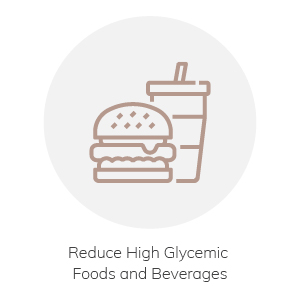
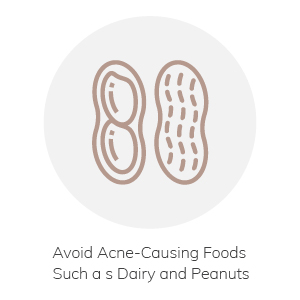
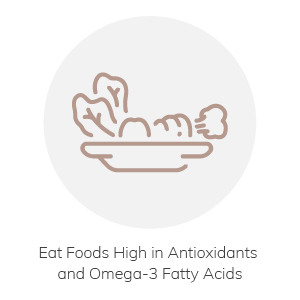
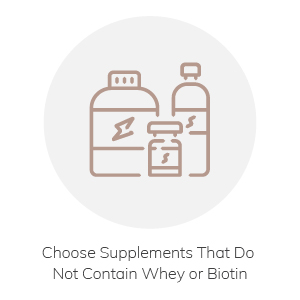
Comments (41)
Can you recommend a more affordable protein powder? Thank you!
Hi Maria,
We recommend SunWarrior Protein Powder. Please let us know if you have any other questions.
Thank you
I just recently discover Trader Joe’s peas protein powder! I have the unsweetened kind. So far no complaints! Blends well with smoothie. I wouldn’t recommend coffee because it requires two scoops to get 20-23 g of protein.
What are alternatives to rice ?
Quinoa, riced vegetables (like cauliflower or broccoli), shirataki rice, barley, freekeh, farro, or bulgur are all great options! Even brown rice is better than white rice as it is less processed and contains higher nutrient value.
Hi! Is Palm fruit oil safe for acne? Recently, I started consuming almond butter and noticed that even though it is a better option compared to Peanut butter, palm fruit oil (one of the ingredients) could be an acne causing food item. Thoughts?
Hi Anu. Consuming Palm oil is not a problem for acne. Palm oil does not mimic hormones the way peanuts do.
do you have a recommendation for breads to buy that is acne safe ?
Hi Malik! Whole grain breads are best, however if gluten is contributing to your acne you may want to choose gluten free breads. An elimination diet can be really helpful for narrowing down what is causing or aggravating your acne.
I am wondering if sunflower seeds are also not good for acne since sunflower oil is a no-no?
Hi Jessi, small amounts of sunflower seeds are okay :).
Hi,
I was wondering if grits is safe to have ?
Hi Malik,
Grits are made from corn, which can be an inflammatory food. It is also often eaten with milk and butter, which are both not good for acne. A smoothie with an acne safe protein powder may be a better choice!
Hello! I’m wondering if you can recommend a good multivitamin for women that is acne safe? Most of the labels I read contain biotin. Thank you!
Hi Alecia!
The Ritual multivitamins for women are acne safe :).
I saw that the omegas in the ritual are from micro algae. Is that still safe?
Hi Jessi,
It is such a small amount that we have not seen problems with it. However, some individuals are more sensitive to iodine than others. If you are super sensitive to seaweed, it may be a problem for you.
I was wondering what is wrong with Dasani water? I don’t personally drink it but I’m curious what is wrong with it.
Hi Sarah, Dasani water contains Potassium Chloride.
Is smart water, essentia, and or liquid death okay for acne ?
Yes, those are fine!
Hi! Is orgain organic protein powder acne safe? It’s plant based, soy free, and vegan.
Hi Nancy. As long as it doesn’t contain biotin, Maca, or peanuts it should be ok.
I was wondering if real sourdough is ok in moderation?
Sourdough in moderation should be fine. Some people have found gluten to be a trigger for their acne, so if you have tried everything else and are still breaking out, you could try eliminating it for a whie to see if it is a trigger for you.
Hi Kayla,
I think you are fine with that unless you have a problem with yeast or candida overload.
One of the most important ways to take care of your skin is to protect it from the sun. A lifetime of sun exposure can cause wrinkles, age spots and other skin problems as well as increase the risk of skin cancer. Wear protective clothing. Cover your skin with tightly woven long-sleeved shirts, long pants and wide-brimmed hats. Also consider laundry additives, which give clothing an additional layer of ultraviolet protection for a certain number of washings, or special sun-protective clothing which is specifically designed to block ultraviolet rays.
I’m curious why maca is an issue? Thank you!
Hi Jessi,
Maca stimulates hormone production, especially testosterone. We see terrible inflammation and breakouts in clients that take it.
Hi there! I recently heard eggs can contribute to acne. Thoughts?
Hi Vicotria. Eggs do not necessarily cause breakouts, however, they are a very common food to be allergic to or have sensitivities to. If you have an egg sensitivity then it could definitely be contributing to breakouts. Doing an elimination diet can be very helpful in identifying trigger foods for you personally.
Hi!
I eat oats a bunch. What’s a good alternative?
Thanks!
Hi Trista! There are some great seeds that can be easily used as an alternative. Some people also love making chia seed puddings. I recommend googling alternatives to oatmeal, there are lots of great alternatives!
Does defatted peanut powder cause acne since the oil is no longer in it?
I would still avoid defatted peanut butter since the issue isn’t the oil but the androgenic effect that peanuts have.
Hi I started eating healthy this year
I avoided sugar and processed food and I purchased neutrogena products that had salicylic acid
But my acne worsened instead
And now I have bad spots on my face
What do I do?
Am I allergic to salicylic acid?
Hi Nancy, a lot of drugstore products contain high amounts of alcohol, fragrance, and irritants that can damage the skin’s moisture barrier. It is likely that causing the irritation. Use lots of moisturizer!
Are there brands of protein bars you can recommend that are acne-safe?
Hi Kristin! Lara bars are safe and tasty!
Hi, what is a good nondairy milk alternative? Is almond milk okay? I have been drinking almond milk, but I noticed nuts are on the things avoid list.
Thank you!
Hi Julie! Oat milk is the safest, but if you are not drinking very much of the almond milk, it is fine!